Varieties of bolts and latches for gates
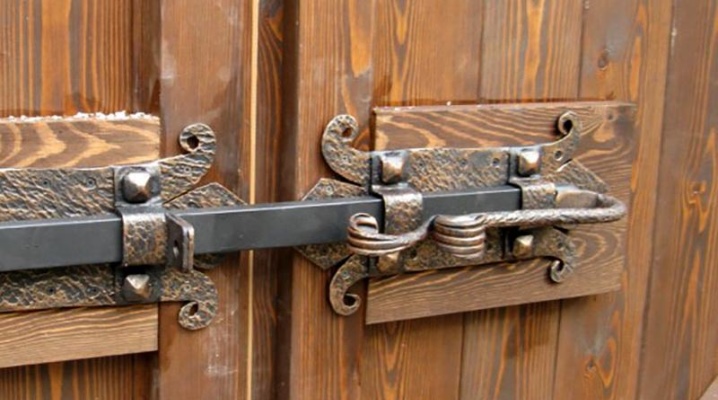
Swing gates have existed since the days of ancient Babylon. Archaeologists say that even then people thought about how to reliably lock the swing gates. Today, in the everyday life of owners of private houses, different types of bolts are used. Most of them are available for DIY. The gates are equipped with bolts from the inside as an addition to a mortise or padlock for a greater level of protection. Also, this approach allows you not to use a key to lock the lock and open it when leaving the territory.
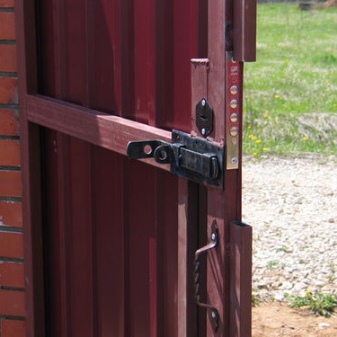
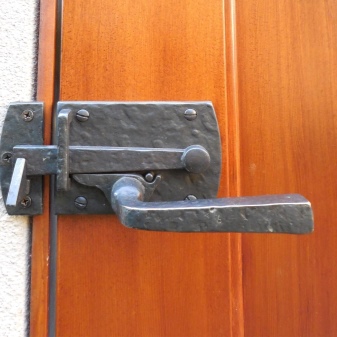
Peculiarities
It is customary to call a deadlock a locking mechanism that fixes the gate leaves in a closed state. In the presence of a well-installed lock, the process of operating the gate is greatly simplified. At the same time, the very entrance structure in the fence becomes much more reliable. Basically, gate bolt models are designed to open leaves only from the inside and do not require the use of keys. That is, it will not work to open the mechanism from the outside.
This means that you do not need to carry any additional keys with you. With a high-quality gate bolt, the risk of intruders entering the private area is minimized. This device is able to keep even very massive sash closed.
Of the undoubted advantages, one can also note the durability and practicality of ready-made and home-made locking structures.
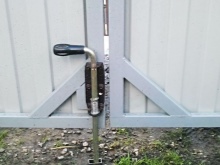
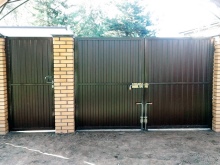
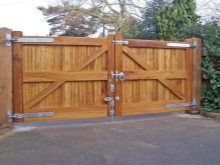
Species overview
Some types of locking devices are available from retail outlets selling household goods. But most land owners prefer to install sturdy homemade bolts on their street gates. For this, material is suitable, which is always at hand with zealous owners. These can be wooden bars or metal channels, rods, etc.
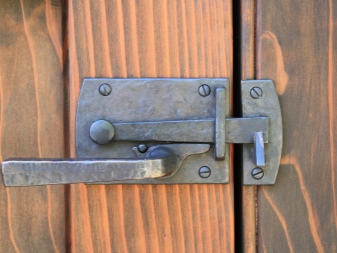
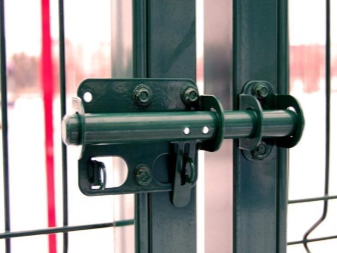
Wooden bolts are traditionally found on wooden gates, and metal ones are suitable for various types of entrance gates: metal, assembled from a profile or combined options. Manufacturing methods may also vary. Original and reliable forged gates look very attractive.
Only this turns out to be quite expensive products, especially if you make a large bolt for the overall gate.
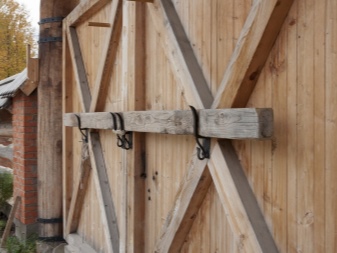
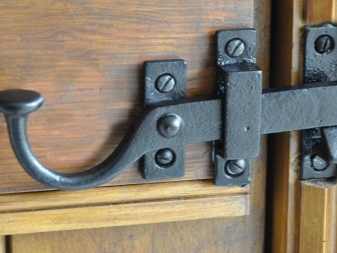
At the same time, one cannot do without experience in metalwork and an equipped home smithy, which is a rarity. Therefore, for the manufacture of locks on the gates at home, they often resort to conventional methods and tools such as drills, grinders and welding. Due to the variety and availability of modern materials and methods, gate locks are presented in a wide range. They may differ in the type of manufacture, location (bottom / top of the sashes) and the way they are locked.
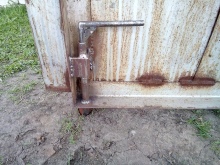
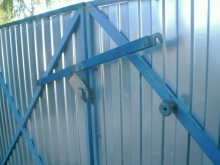
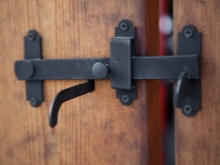
Spinner
This type of bolt often serves as a temporary structure or as an additional locking mechanism. The elementary device is quite practical, it is considered the most reliable "folk" bolt, easy to manufacture. In any case, such a bolt for swing gates will have to be built with your own hands, because its industrial counterparts are not on sale. The spinner is made individually for each gate. The creation of a rotary bolt will be mastered by any home craftsman.
Perhaps the bolt will not look very presentable, but reliability and strength will cover this dubious minus.
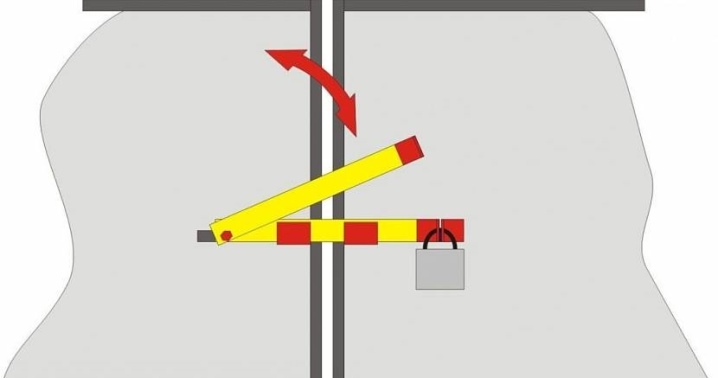
Barrier
Like the "spinner", the barrier refers to the rotary bolts. The construction, ready for installation and operation, is not found in specialized stores and markets. But with a minimum of effort and spending several hours, you can create a product with a durable service life, resistant to temperature extremes and high humidity, reliably protecting a private area from uninvited guests. According to the design principle, the barrier is similar to a revolving wheel, only the locking metal strip is not installed in the grooves welded separately, but directly into the channel, which is welded to the entire width of the second gate leaf. Additionally, it is recommended to weld lugs at the end of the channel and the locking strip in order to additionally fix the deadbolt with a padlock.
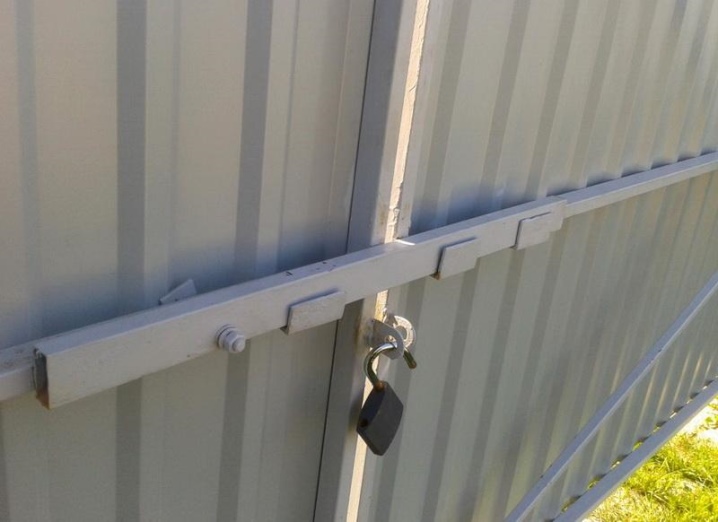
Espagnolette
A gate of this type is equipped from the outside. Espagnolettes (latches) are presented in outlets of any city in an extensive assortment. The principle of operation of the device is to manually move the crossbar along the furrow. Among the popular models of latches are small products for the entrance part of gates, wickets, wardrobes and storage rooms. There are also massive latches on sale, made for installation on swing gates. But if you make such a bolt on your own, you can increase its reliability and durability. If you want to do this, it is enough to choose a suitable piece of metal pipe.
A reinforcement (rod) is inserted into it, and at this stage the design work is considered completed.

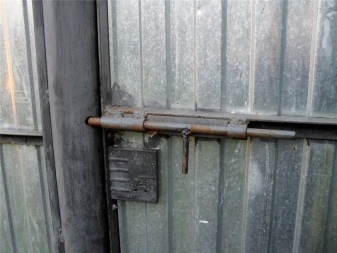
Self-flapping latch
Many people prefer to install locks on the gate, which facilitate the slamming process. A simple and reliable device is easy to make handicraft. A metal tongue with a stop is installed opposite the gate leaf, fixed with a bolt and a nut, with the possibility of rotation from one end. When the sash is closed, the mechanism is triggered, the tongue rises and latches automatically, leaving the sash in the closed state under the influence of its own weight. It is not difficult to make a spring version of the latch, if you install it from below.
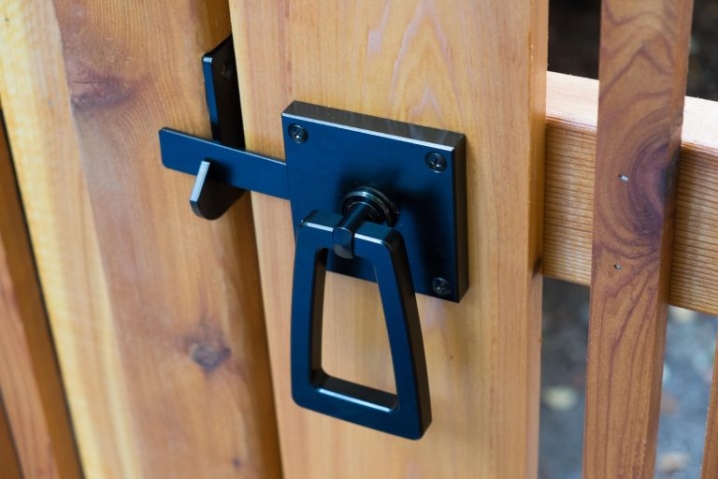
For automatic opening of the shutters, both electromechanical and electromotive latching devices are used.
- Electromechanical - the locking part of such a mechanism is set in motion under the influence of an electromagnetic field. The crossbars of such constipations work according to the following principles: in the absence of power supply, under the action of the springs, they remain extended, and upon a signal they are retracted; when a signal turns on the current in the circuit, the crossbars move out and do not change position until a new signal is received.
- Electromotor - the locking part performs its function under the influence of an electric motor with a gearbox or by means of a worm gear. The gearbox type develops a significant effort, therefore it does not react to the distortions of the gate, and the worm gears are more nimble, seconds are spent on the opening process.
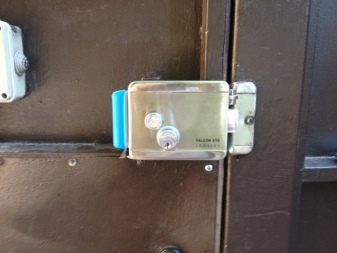
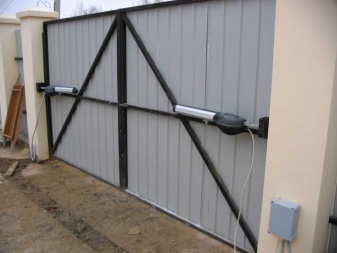
Some specialists in the installation of automatic opening systems for swing gates refer to the locking system and safety photocells, since they react to the closing of the gate when there is an object in the alignment.
Therefore, they also take part in the movement of the valves. There are many different constipations of the first and second types on the market, so if you want to install such a device on an automatic gate, you just need to purchase a suitable set of units. Although this locking system can be done by yourself. The Internet offers various videos for viewing, the creators of which clearly demonstrate how they got such automatic designs from the materials at hand.
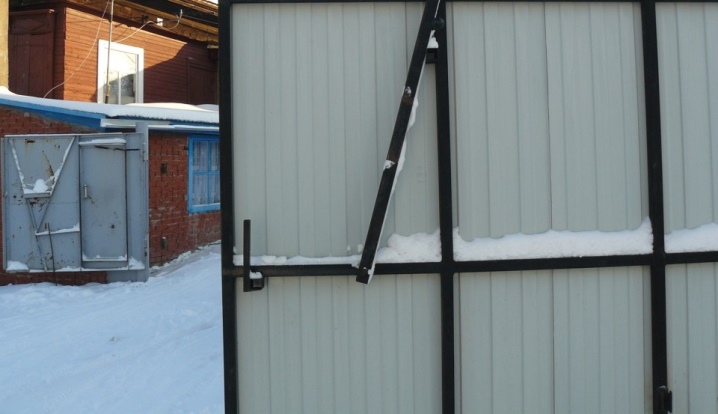
By construction type
By design, constipation is divided into 4 types.
- Bolt. A simple device to assemble in a short time.They are distinguished by excellent durability and reliability of holding the shutters even in squally winds.

- Constipation with additional lugs. Made of steel, most often mounted on garage doors.
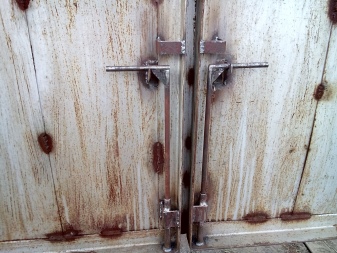
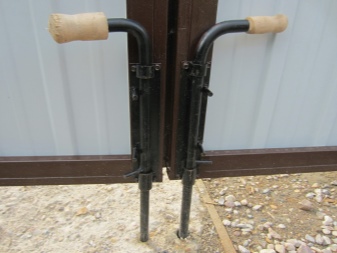
- Pin bolt. For this transom structure, pipe cuttings and meter or half meter metal rods are used.
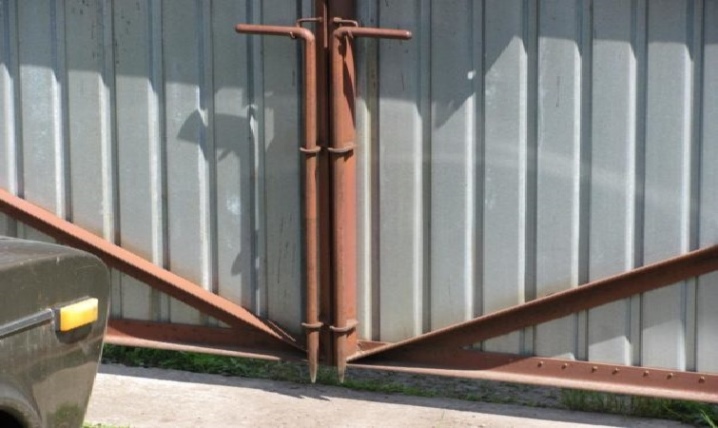
- Latch for sliding gates. Consists of two pairs of bent hooks and a steel plate. Wood is also suitable for production. Wooden bolts are often found on country gates and garden gates.
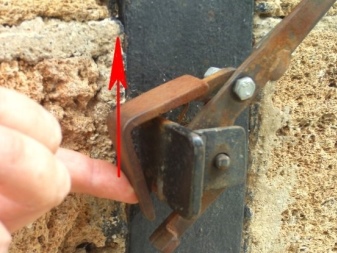
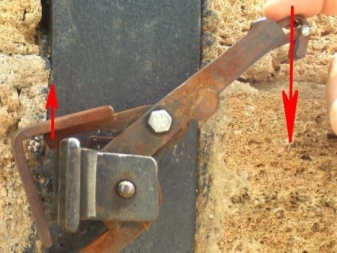
Typing is also done on the principle of action.
- Sliding. Known as the heck. Represents a rod of flat configuration, fixed in stops.
- Screw. Installed from the outside of the gate. A clever latch is set in motion with a special key.
- Slotted type with swivel mechanism. One of the simplest types, although it is very problematic to make it manually.
- With fixation. This type is used in addition to the main complex of shutter devices.
Electronic automatic, electromechanical with spring mechanism and magnetic. This subclass includes a number of mechanisms with and without a spring. Closing and opening is carried out when electricity is supplied.
Their use provides great opportunities for exploitation, but it is not always justified.
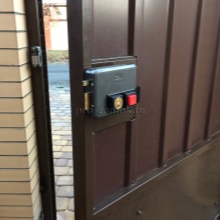
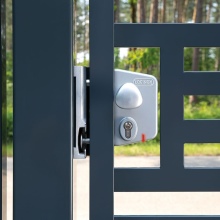
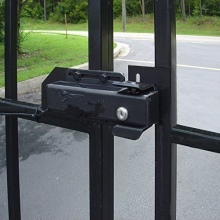
By fastening method
The methods differ in their principle of the location of the fixing part and fasteners.
- Turning. Locks of the type "Turntable" or "Barrier". They are easy to manufacture, strong and hold the sash securely. Most often they are made of sturdy wooden beams. The downside is their visual massiveness and "old-fashioned" design. However, in the design of a certain type, it is precisely such a bolt model that will look harmonious and dignified. A simple device in the form of a barrier or a turntable effectively fixes heavy canvases, preventing strangers from intruding into private territory.
- Sliding horizontal. These include standard strip bolts and "latch" type. The disadvantage of such a constipation is the lack of a strong fixation, since in a strong wind, the flaps from the corrugated board can twist. It is recommended to install 3 pcs. valves for better fixation of the sashes, observing a gap of 50 cm from the top and bottom, and one of the valves must be placed in the middle, on the stiffener.
- Retractable vertical. Locking mechanism for holding the leaves separately.
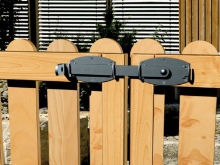
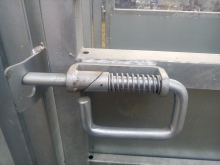
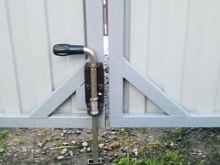
Selection Tips
Each lock model is selected and installed according to the door design. What is suitable for sliding gates will not be appropriate for swing-type fences. Sometimes it is profitable and reliable to build a makeshift bolt than to buy a less durable analogue in a store. A locking mechanism from a profile pipe will be a very reliable homemade option to protect the gate from burglary.
A sturdy wooden beam is suitable for lifting locks. This is optimal for wooden gates and profile doors in suburban areas.

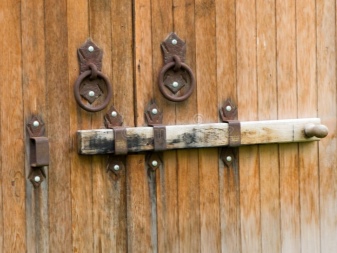
Summer residents often resort to the manufacture of such bolts and screw additional valves from the reinforcement to the sashes. It is advisable to install reliable locking latches on sliding gates. It is better to additionally reinforce fastenings on metal doors with hinges for a padlock. This will increase the reliability of the locking system.
The latch will be difficult to use if the gate does not have additional locks at the top or bottom. You will have to hold the sash, which is not always convenient. Therefore, the structure must be additionally reinforced with clamps. These devices can be found at a hardware store or made yourself, according to the instructions. Depending on the material of the shutters, the design and size of the valve are selected.
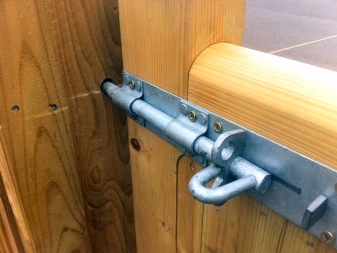
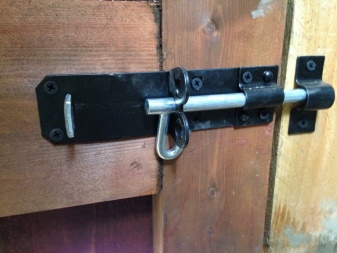
Installation
Whichever bolt is chosen for the gate, it is important to remember that the reliability of protection against burglary depends not only on its design, but also on the quality of its installation on the very gate. Each type of locking device has its own nuances regarding the installation process. They will have to be taken into account if you want to put one or another version of the bolt on the gate. The turntable can be installed on any gate. In this case, everything is done simply and quickly, even without outside help.
Finding an industrial turntable in a store is not an easy task, so it's easier to make it yourself. To create an artisanal bolt, you need a bar and strips of metal. It is advisable to choose a block of 50 mm thickness. The mechanism is arranged so that the mount is located in the center of the base of the device, and in the process of turning, the "wings" lock two flaps.
Basically, this design is used as a temporary locking mechanism.
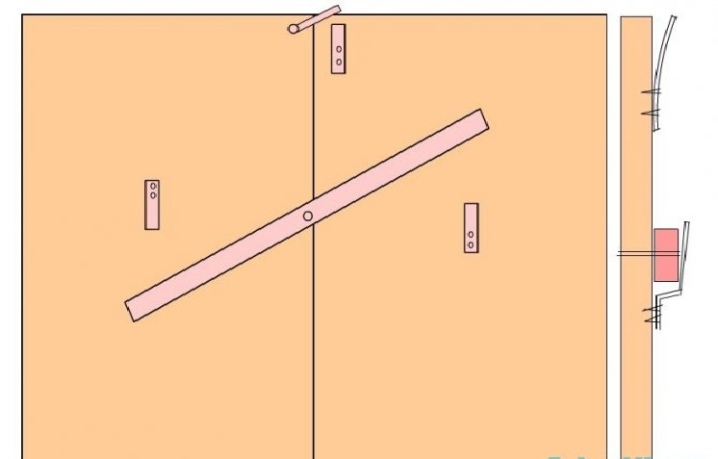
The process of making a turntable looks like this. Exactly in the middle is a wedge-shaped bar fixed with a through bolt. If necessary, the bolt can be moved along the bars by a swivel mechanism. When closing, the sash will rest against wooden blocks. They have the most dense abutment, which is considered a significant advantage.
It will be impossible to open the gate from the side of the street, since there are no details of the castle on the canvas. You can add more functionality to the model by equipping with additional vertical locks made of a metal tube from 10 cm in diameter. The tube is cut into three elements, one of them is 10 cm long, and the other two are half as long. The latch is mounted only on a flat surface. Otherwise, the rod will not be able to get into the groove. As a supporting security measure, the mechanism is equipped with additional ears, on which an additional lock can be hung.

It is very easy to attach the espagnolette, installation will take a minimum of time.
It is recommended to complement the horizontal bolt with vertical bolts. The longest part is welded horizontally at the edge of the web. One of the shorter lengths is welded to the opposite end of the long tube.
Next, a latch is inserted here, bent from a metal pin (the pin is selected in diameter so that it slides into the tube cavity without effort). The espagnolette is moved all the way, and the third short part of the pipe is welded to the edge. The lock is fixed with a metal plate fastener. Additionally, they equip the lugs for the padlock.
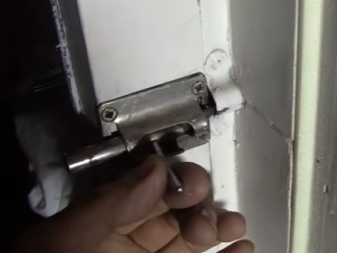

The sliding vertical bolt is installed on the gate at the bottom of the leaf. In rare cases, for example, if there is a strong frame, installation in the upper part of the door is allowed. A horizontal valve is mounted on one of the leaves and holds between two leaves or one of them and the frame. Usually, in this case, at least one sash is additionally secured with vertical clamps.
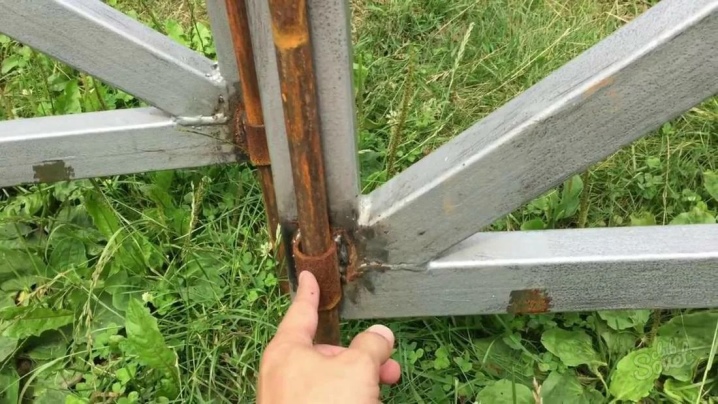












The comment was sent successfully.